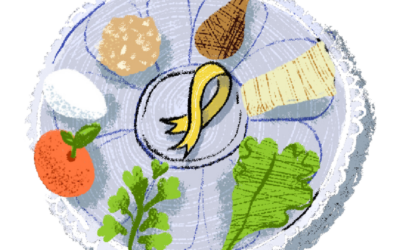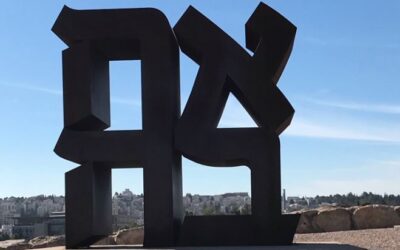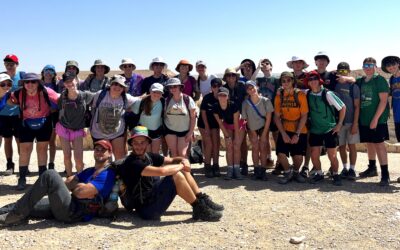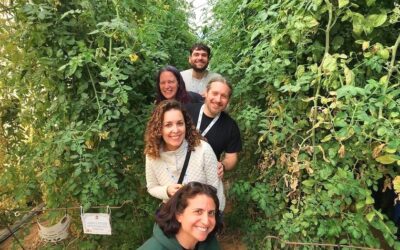By Rabbi Josh Weinberg, Vice President of the URJ for Israel & Reform Zionism & Executive Director of ARZA
Yom Kippur has come and gone, we’ve deprived ourselves, fasted, and done tshuvah for our sins. Now it is time to rejoice. If there was ever a time for rejoicing and happiness it is after the most serious and somber days of the year (which also does not require deprivation from joy). The Rabbis actually nicknamed Sukkot, Z’man Simchatenu, the Season of Happiness. The Sukkah itself creates the most natural reason for families and friends to invite and visit each other for festive meals within that dwelling. In fact, the mitzvah of welcoming guests or Ushpizin is one of the greatest mitzvot one can do, as one is reminded of the teaching of the Vilna Gaon, who taught that there are only two mitzvot that one can enter with one’s entire body: residing in the Land of Israel and dwelling in a Sukkah. But while we’re busy rejoicing, making paper chains, shaking our lulavs and etrog, and hanging out in these temporary booths, there may be a deeper meaning for us a people to the holiday of Sukkot.
Rabbi Shimon Gershom Rosenberg (1949-2007, known popularly as Rav ShaGaR) was a trailblazing Israeli thinker, rabbi, and Rosh Yeshiva who wrote prolifically and taught on Judaism, halakha, and philosophy. In a posthumously published book of his essays called “Faith Shattered and Restored: Judaism in the Postmodern Age,” Rav Shagar attempts to deal with one of the great divides among the Jewish people, those who live in the Land of Israel and those who remain in the Diaspora for which he sees the holiday of Sukkot as a quintessential example and metaphor for our split existence.
“The path from exile to redemption in the Land is expressed by way of the mitzvah of Sukkah. The Sukkah, a temporary dwelling that parallels the temporary exile, is also compared to the Land of Israel,” he writes. In his essay “Seventy Bullocks and One Sukkah: The Land of Israel, Nationalism, and Diaspora,” Rav Shagar tries to go beyond the classic Religious Zionist narrative and implicitly acknowledges the failure of Religious Zionism to recognize the religious significance of Exile and universalism.
The classical Zionist narrative (based on the teachings of Rav Kook and Ahad Ha’am, among others) explicitly positions the Land of Israel is at the center of our existence. However, the dissolution of grand narratives enables Rav Shagar to see a more complex picture in which the Diaspora is also an authentic expression of Jewish existence. In doing so, he offers an interpretation that may be appealing to Zionists who live in North America and have no plans to make aliyah.
Basing himself on the Maharal of Prague (d.1609), he explains that the Jewish people unquestionably have an essential connection with the Land of Israel, yet the fact that they were able to sustain themselves through two thousand years of dispersion across the world indicates that universalism is also part of their nature. Rav Shagar further explains that “Indeed, the entire world is their place, they are cosmopolitan, and their state of dispersion is a function of their virtue … Its place is beyond geography, and its identity transcends the constricted boundaries of nationhood” (p.181).
The sukkah is a unique symbol that demonstrates the ways in which Diaspora and the Land of Israel must dwell together along with universalism and nationalism. The sukkah is a symbol of exile because it requires us to leave our secure home and all that is comfortable. However, it is also a profound symbol of the Land of Israel because it is deeply connected with the agricultural cycle which informed the pilgrimage holidays to Jerusalem, for which many Diaspora Jews are sadly disconnected.
Rav Shagar writes that:
“The insecurity of the Diaspora must deeply inform our confidence as the inheritors of the Land. Otherwise, confidence will degenerate into hubris, into the sense that all is due to ‘my power and the might of my hand.’” It is essential for nationalism “if it is not to turn rigid and callous, it must be tempered by universalism.” The same is also true in reverse for, without nationalism, universalism can be dangerous. It can turn into “an abstraction in that it “makes” all human beings identical, effacing the very real differences between people” (p. 186).
Sukkot is a holiday that brings all these contradictions together and shows the potential for their resolution. It is both true that the Jews are a nation that dwells apart and that all nations still come to Jerusalem in order to worship God on Sukkot. As the majority of Diaspora Jews neither see ourselves as living in Exile and [possibly correlatively] do not have any intention of uprooting our lives to live in Israel. So, the Sukkah can give us the simultaneous experience of celebrating both the harvest season of the Land of Israel and the sense of Exile.
On Sukkot, we can embrace both nationalism and universalism. Nationalism – despite its somewhat negative perception in the current political atmosphere – is essential as it is rootedness in what one is, in an identity unique to the nation and the individual. But, in order for it not to turn callous or even racist, it must embrace universalism which, according to Rav Shagar, subverts the preference for one nation over another, and in religious terms is the place where we encounter the image of God.
On Sukkot we present this dichotomy between Diaspora and homeland. It is quite remarkable to imagine that those who live far away from Israel still celebrate its harvest festival and that those living in Israel take a week to internalize the concept of exile. When you enter your Sukkot this year, may you rejoice in this happiest of times and catch a try to get a sense of both Israel and Diaspora.






